- Home
- Cheryl Bolen
A Lady by Chance (Historical Regency Romance)
A Lady by Chance (Historical Regency Romance) Read online
Praise for A Lady by Chance
Cheryl Bolen has done it again with another sparkling Regency romance. . .I highly recommend
it. – Happily Ever After
Anna de Mouchet has the stuff of which Regency heroines are made – the right stuff, that
is! – In Print
***
The Marquess of Haverstock is incensed when he learns the money he needed to buy crucial war information for the Foreign Office has been lost at cards to the illegitimate daughter of an English duke and French noblewoman. When the bewitchingly beautiful woman informs him the only way to reclaim the funds is to wed her, he has little choice but to agree.
Shunned by the ton, Anna de Mouchet agrees to a bizarre proposal that has her using her skill at cards to force the marquess – whom she’s been told is a traitor – to marry her. As his wife, she will be free to spy on him and prove her patriotism to England. But once she marries the handsome lord, she’s less sure of her loyalties. Especially when she feels her husband’s silken touch.
E-books available from award-winning author Cheryl Bolen
Regency Historical Romance:
The Brides of Bath Series
The Bride Wore Blue*
With His Ring*
A Fallen Woman*
To Take This Lord (previously titled An Improper Proposal)*
My Lord Wicked
Lady Sophia's Rescue
The Earl's Bargain
With His Lady's Assistance
Christmas at Farley Manor
A Duke Deceived*
A Lady by Chance*
Romantic Suspense:
Protecting Britannia (Texas Heroines in Peril)
Murder at Veranda House (Texas Heroines in Peril)
A Cry In The Night (Texas Heroines in Peril)
World War II Romance:
It Had to Be You (Previously titled Nisei)
* Previously published in paperback
A Lady By Chance
Cheryl Bolen
Copyrighted 2011 by Cheryl Bolen
Table of Contents
Prologue
Chapter 1
Chapter 2
Chapter 3
Chapter 4
Chapter 5
Chapter 6
Chapter 7
Chapter 8
Chapter 9
Chapter 10
Chapter 11
Chapter 12
Chapter 13
Chapter 14
Chapter 15
Chapter 16
Chapter 17
Chapter 18
Chapter 19
Chapter 20
Chapter 21
Chapter 22
Chapter 23
Chapter 24
Chapter 25
Chapter 26
Chapter 27
Chapter 28
Chapter 29
Chapter 30
Chapter 31
Prologue
London, 1808
Anna de Mouchet studied the deck spread face down in her hands. It was remarkable that no one ever noticed how the birds' eyes varied on the back of the cards. Narrow eyes were face cards. Cards of lower denominations featured regular eyes. And the birds on the aces had round eyes. Of course, the men who had played at her mother's tables would have been more engrossed in the beauty of the dealer than in the etchings on the cards that assured her mother's winnings. Anna flipped over a king and smiled as she heard her chamber door smoothly open.
"Mademoiselle!" the maid screeched as she lightly kicked shut the door behind her and nervously scurried into the room, balancing her young mistress's breakfast tray. "Your mama would be most furious were she to know you still play with her cards. She desires nothing but to make a fine lady of you, cheri."
No one was closer to Anna's mother than Colette, who had accompanied Annette when she fled the Terror more than fifteen years ago. Had it been discovered Annette de Mouchet was a noblewoman, Colette could have lost her head.
"But I don't want to be a lady," the girl protested. "I don't want to go to that fancy school. Unlike Mama, I know I will be treated with no more civility at Miss Sloan's School for Young Ladies than we have received from our hostile neighbors here on Grosvenor Square."
"But your mama wants you to make friends with the daughters of the ton. After all, are you not one of them?"
Anna thrust out her chin and spoke through compressed lips. "I can never be one of them and well I know it."
Shortly after breakfast Anna was surprised to see a crested barouche in front of her house. The crest did not belong to any of her neighbors on Grosvenor Square, and her mother had not entertained noblemen since they moved here from Marylebone a year ago.
Anna walked to the morning room to see who was calling but found the doors closed and heard angry shouts from within.
"I will not have the illegitimate daughter of a French whore at school with my own daughters," an angry male voice said.
"My daughter has just as much right to be there as yours," Annette said defiantly. "Even more, for her father was more exalted than you, my lord."
Proud of her mother's fiery retort, Anna listened, fury pounding in her chest, as the man spoke.
"You schemed to get money that should have gone to Steffington's duchess, but you can never buy rank for your bastard."
Annette's voice quivered. "I took not a farthing from Steffington while he lived. Only his love. That is why I receive your rancor. Because of me, he would not bed your wife's sister. Now his money has come to his only child." Her voice cracked. "If it takes every shilling I own, our daughter will be a fine lady."
"Not by going to Miss Sloan's School for Young Ladies," he countered angrily. "I have a letter from the headmistress. She regrets to inform you there is no room for Anna de Mouchet."
The door suddenly flung open and a portly man in fine clothes swept past Anna without looking at her.
Anna scurried across the room to her Annette, who collapsed on a silken sofa, sobbing into her hands.
"Mama, please don't be upset," Anna soothed, leaning so close to her lovely mother she could smell her rose water. She gently hooked an arm around her. "I will be much happier here with you, and not with daughters of that horrid man. Pray, who was he?"
Sniffing, her mother gazed toward the doorway and spoke softly. "That was the Marquess of Haverstock."
Chapter 1
London, 1813
The Marquess of Haverstock dismissed his butler and firmly closed the doors of his library himself before showing his friend to a comfortable club chair near the fireplace and pouring two glasses of port. He settled in a broad chair before the fire where the smell of burning wood was strongest. "Our necessity for utmost secrecy cannot be stressed enough," Haverstock said in a voice much lower than his usual commanding style. "I have to be particularly cautious in this house filled with wretched females."
Ralph "Morgie" Morgan took a rather large swig of port. "Don't know how you tolerate it, my good man. Five sisters." Morgie shuddered as if the port had been poisoned.
"There are only four left, now that I've married off Mary."
"Oh, jolly good. Only four," Morgie said good naturedly.
Now the marquess shuddered. By the time he had provided four more dowries, he would not be able to afford to get married himself. Not that he wanted to, but still he cursed his father for leaving them so lean of pocket.
As if reading his friend's mind, Morgie said, "You really aren't bound to provide hefty dowries for the gels. Got to leave something for yourself."
"Then I'd be no better than my father."
Morgie swallowed
and cast a glance at the painting of the marquess' brooding father over the fireplace. He loosened his cravat. Even from the grave, the former marquess could render one uncomfortable. Diverting his gaze from the intimidating portrait, he said, "I say, you'd have pots of money if you'd spend more time on your own affairs and less at the Foreign Office."
"Duty to one's country must take precedence over personal gratification. Which recalls me to the matter you and I need to discuss."
"Ah, yes." Morgie glanced at the door, then lowered his voice. "Came straight away to inform you the loan has been approved. Thank the bloody good Lord my father approved it before his recent demise. Otherwise, I'd have the devil to pay to get a shilling before his estate is settled." He looked pleased with himself when he announced, "I'll have the money in the morning."
The marquess's eyes brightened. "Excellent."
"Excellent for you. And even for England, but bloody bad for me. Since we could not disclose the clandestine nature of the loan, I had to say the whole bloody fifty-thousand pounds was to pay off my gaming debts. I feel like an utter baboon."
"Come now, Morgie. Your heavy gaming is a matter of public knowledge in London."
Morgie took another drink. "Never lose more than I can afford."
"That may be, given that every member of your family has more money than a nabob. And it is my good fortune that my closest friend is a member of the renowned Morgan banking scions."
Haverstock quietly studied his friend as Morgie slightly loosened his expertly tied cravat. Morgie, as Haverstock had referred to Ralph Morgan since their days at Eton, might not possess the keenest intellect, but he displayed impeccable taste. Perfectly tailored clothing – with extra padding over his slim shoulders – set his figure off to distinction, and his dark brown hair always appeared portrait perfect in the most fashionable, understated style. In addition to his exemplary physical appearance, Morgie's manners were above reproach. Because of his vast wealth, he was accepted everywhere despite that several members of the ton, including Haverstock's deceased father, quietly snubbed Morgie because of his Jewish lineage.
"If you get the money in the morning, we should be able to leave for France the following day," Haverstock said, fingering the cut crystal glass from which he had yet to drink. He did not share his friend's excessive fondness for liquor. "It's imperative we're in France by the twentieth."
Morgie nodded, patting his chest. "Had my tailor make a special coat lined with several inside pockets to hold a large portion of the money."
Haverstock sat up straight, his black eyes flashing with anger. "You didn't tell the man you'd be carrying large sums of money?"
"Course not, Haverstock. What do you take me for? I'm not a bloody idiot. Told the tailor I'd be traveling and had to carry documents, snuffboxes and hordes of medicinals."
Haverstock relaxed his large frame and smiled. "It's just that except for a select few who work with me at the Foreign Office, no one is to know we will be traveling with the money."
"And none of them know either your destination or the recipient of the cash. Correct?"
"Only me. And only because I speak French as a native. I've received excellent information from our French official in the past, and I completely trust his validity."
"How can you trust a man who sells his own country's secrets?"
Haverstock steepled his hands in thought. "It's because he's a patriot he wants to thwart Napoleon. Too many Frenchmen have spilled blood for Boney."
"Right he is about that Corsican monster, but does this Frenchman have no conscience about his information leading to the slaughter of more French?"
"He's been able to assuage his conscience by convincing himself the emperor's armies now consist mostly of foreigners who've been conquered by the French."
"Can't fault that, either."
Rising, Haverstock blew out a nearby tallow. "You must stay here tomorrow night so we can get an early start the following morning."
Anna pulled off her drab brown gloves and carefully placed them on her silken bed before untying her equally drab bonnet and depositing it next to the gloves for Colette to put up when she returned from her half day off. Of course, Anna was in for a thorough scolding from her life-long abigail. First, Colette would be angry because she had gone to the East End without her protection. Anna smiled, amused at the unlikeliness of the thin old maid preventing even the harmless fleecing of a street urchin.
Next, Colette would chide Anna for going out in such unfashionable attire.
"You must always dress as the grand lady you are," Colette recited daily.
But despite the last wishes of her mother, Anna knew she would never be a lady, nor would she ever be welcome in the fine homes of Mayfair. She dropped onto the chaise and lamented the dreariness and hopelessness of her life. She was eighteen years old, the owner of a large fortune, not at all unattractive, yet she had no hope of being presented. And even less hope of marrying a gentleman.
In her loneliest moments she gave way to a deep, aching longing to share her life with a man who would accept her as an equal, someone who would love her and give her the children she so desperately wanted.
Even more than the partnership and the children, she hoped for a love as powerful as her parents', a love so strong they had happily deflected society's scorn. But her parents' imperfect union had created a daughter who could never belong to either of their worlds.
Anna cast her head heavenward. Oh, Mama, I'm sorry to disappoint you.
The most social situation Anna ever encountered was her Sunday morning church service where the ladies enviously eyed her exquisite clothing while the men endeavored to make her acquaintance.
She stretched out her legs and sighed. It is I who is so unfortunate I need the people of the East End more than they need me. In the five years since her mother's death, the trips to the East End had provided her only joy. She had no friends. No male admirers. Her solicitor was her only caller. She had long since dismissed her dancing master over Colette's objections, for Colette still harbored illusions that Anna would go to fine balls and dazzle the young men as her mother had done in France so many years ago. The devoted Colette would never concede the futility of Annette's dreams for her daughter.
While Anna was engaged in her morose thoughts, Perkins rapped forcefully at her chamber door. "A caller for you, Miss de Mouchet."
Anna sat upright, startled by the announcement. Her solicitor had been here yesterday, so he would not be calling again. Who could her caller be? Walking to the door, Anna asked, "Pray, who is it?"
As she opened the door, Perkins handed her a gentleman's card.
It was Sir Henry Vinson's.
"Tell the gentleman I will be down in ten minutes."
Even if she had never been particularly fond of Sir Henry, she would meet him in one of her most fashionable morning dresses. Colette might contemplate murder otherwise.
As she removed the old East End garments, Anna wondered why Sir Henry would be calling. She had scarcely seen him since her mother's funeral. She had always suspected he had been in love with her mother, but Sir Henry was far too selfish to marry. He must be fifty now, and she had yet to hear of him marrying.
She felt a stab of fear at the fleeting thought that perhaps he wished now to marry. To marry her for her fortune.
She would never be that desperate.
Sir Henry gazed out the window at Grosvenor Square. He was surprised over his own nervousness at facing Annette's daughter. Of course, his very future could depend on the outcome of the meeting. He hated to admit a mere girl held his fate in her inexperienced hands, but he remembered her deft hands effortlessly shuffling and dealing cards as one born to the task. Smiling, he knew it was in her power to bring him the riches he had sought for so long.
Twenty-five thousand pounds now. And later, the promise of a ministry in France. Bonaparte himself had offered the Palais Vendome to Sir Henry if his activities here in London met with success.
How he despised these arrogant English aristocrats! Especially the straight-laced Haverstock. Though the young marquess avowed disdain for his deceased father, he very much reminded Sir Henry of his sire. Both men had been decidedly cool toward Sir Henry, and the son shared no confidences with him though they worked in the same department at the Foreign Office. He was every bit as haughty as his father had been.
Sir Henry's back was to Anna when she entered the room. He turned when he smelled the rose water. Annette's scent. He froze as Anna greeted him. It was as if he were being transported back in time nearly thirty years, to the Recheaux Chateau, recalling a time of lavishment that was now as buried as the pharaohs and as unlikely to ever be resurrected. A time before the revolution.
If it weren't for her very English voice, Anna de Mouchet would be an exact copy of her mother, he thought, his heart racing even now as he remembered his devotion to Annette. No woman had ever been more beautiful. Yet, this girl before him was. He noted her dark brown locks which glistened golden in the late afternoon sunlight. Her creamy, petal-soft skin with natural pink in her cheeks set of her spectacular eyes. They were large and almond shaped and the color of rich coffee beans. God's teeth, but they were beautiful! Even her figure was perfection.
And, he noted appreciatively, she had inherited her mother's taste for what was the finest a modiste had to offer. She wore a pink gown of exquisite cut, just low enough in front to reveal her ivory chest and to display the promise of a woman's full breasts. His eyes traveled down the length of her, resting at her satin slippers that were a perfect match to her dress, both of them accenting the blush in her cheeks.
"Ah, Anna, you are the very picture of you mother."
"I perceive that as a compliment, Sir Henry." She indicated a settee. "Do have a seat. Will you have tea?"

 With His Lady's Assistance (The Regent Mysteries Book 1)
With His Lady's Assistance (The Regent Mysteries Book 1)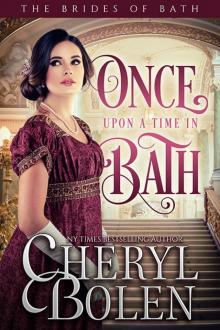 Once Upon a Time in Bath
Once Upon a Time in Bath One Room at the Inn (The Lords of Eton Book 4)
One Room at the Inn (The Lords of Eton Book 4) His Lady Deceived
His Lady Deceived Last Duke Standing
Last Duke Standing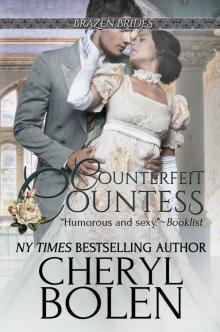 Counterfeit Countess: Brazen Brides, Book 1
Counterfeit Countess: Brazen Brides, Book 1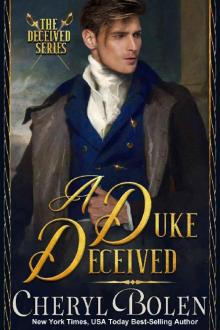 A Duke Deceived (The Deceived Series Book 1)
A Duke Deceived (The Deceived Series Book 1) An Egyptian Affair (The Regent Mysteries Book 4)
An Egyptian Affair (The Regent Mysteries Book 4) Winter Wishes: A Regency Christmas Anthology
Winter Wishes: A Regency Christmas Anthology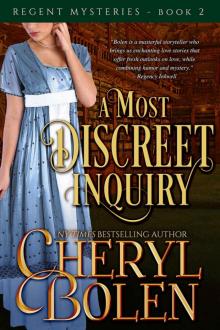 A Most Discreet Inquiry (The Regent Mysteries Book 2)
A Most Discreet Inquiry (The Regent Mysteries Book 2) The Portrait of Lady Wycliff
The Portrait of Lady Wycliff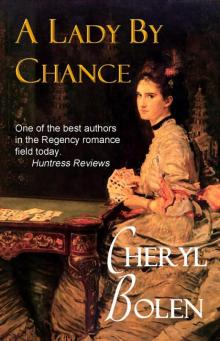 A Lady by Chance (Historical Regency Romance)
A Lady by Chance (Historical Regency Romance) His Lordship's Vow (Regency Romance Short Novel)
His Lordship's Vow (Regency Romance Short Novel) Lady Sophia's Rescue (Traditional Regency Romance)
Lady Sophia's Rescue (Traditional Regency Romance) A Birmingham Family Christmas
A Birmingham Family Christmas Oh What A (Wedding) Night (Brazen Brides #3)
Oh What A (Wedding) Night (Brazen Brides #3) A Christmas In Bath
A Christmas In Bath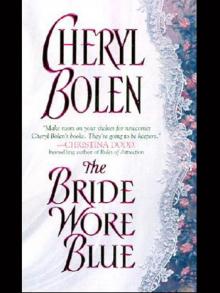 THE BRIDE WORE BLUE
THE BRIDE WORE BLUE Miss Hastings' Excellent London Adventure (Brazen Brides Book 4)
Miss Hastings' Excellent London Adventure (Brazen Brides Book 4)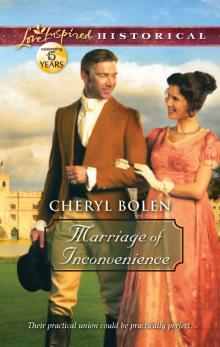 Marriage of Inconvenience
Marriage of Inconvenience Ex-Spinster by Christmas: House of Haverstock, Book 4
Ex-Spinster by Christmas: House of Haverstock, Book 4 With His Ring (Brides of Bath Book 2)
With His Ring (Brides of Bath Book 2) The Theft Before Christmas (The Regent Mysteries)
The Theft Before Christmas (The Regent Mysteries) The Theft Before Christmas
The Theft Before Christmas To Take This Lord (The Brides of Bath Book 4)
To Take This Lord (The Brides of Bath Book 4)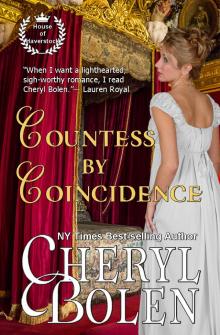 Countess by Coincidence
Countess by Coincidence Captivated by His Kiss: A Limited Edition Boxed Set of Seven Regency Romances
Captivated by His Kiss: A Limited Edition Boxed Set of Seven Regency Romances A Birmingham Family Christmas (Brazen Brides Book 5)
A Birmingham Family Christmas (Brazen Brides Book 5)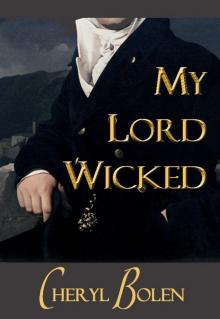 My Lord Wicked (Historical Regency Romance)
My Lord Wicked (Historical Regency Romance) A Duke Deceived
A Duke Deceived The Earl, the Vow, and the Plain Jane
The Earl, the Vow, and the Plain Jane The Bride's Secret
The Bride's Secret The Earl's Bargain (Historical Regency Romance)
The Earl's Bargain (Historical Regency Romance) Rebels, Rakes & Rogues
Rebels, Rakes & Rogues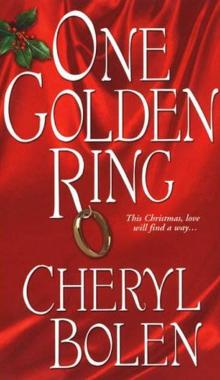 One Golden Ring
One Golden Ring